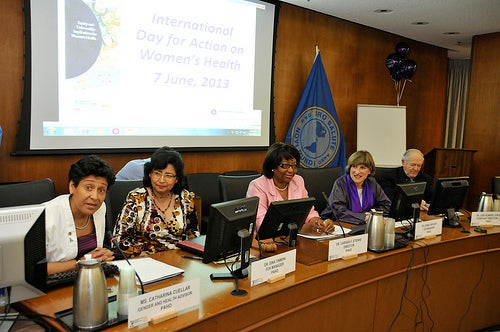

An Ecuadorian initiative that saves maternal lives by integrating ancestral practices with modern medicine and an Argentine effort that involves men in HIV testing and counseling and prevention of mother-to-child transmission of HIV were honored as "best practices" today by the Pan American Health Organization/World Health Organization (PAHO/WHO).
Washington, D.C., 7 June 2013 (PAHO/WHO) — An Ecuadorian initiative that saves maternal lives by integrating ancestral practices with modern medicine and an Argentine effort that involves men in HIV testing and counseling and prevention of mother-to-child transmission of HIV were honored as "best practices" today by the Pan American Health Organization/World Health Organization (PAHO/WHO).

The two initiatives were the winners of the sixth annual Best Practices that Integrate Gender Equality and Ethnicity in Health contest, organized by PAHO/WHO with additional support from Spanish Cooperation and the Canadian International Development Agency (CIDA).
This year's contest highlighted initiatives that seek to strengthen men's paternal responsibility and to transform the attitudes of men, women and health providers through a gender perspective and by promoting respect for and recognition of ethnicity, as strategies to improve opportunities to enjoy optimal health.
PAHO announced the winning best practices in coordination with the Latin American and Caribbean Women's Health Network, as part of the commemoration of the International Day of Action for Women's Health, which marks women's right to health through actions that support better health outcomes.
"Women live longer, are caregivers, have different burden of disease and have specific health needs," said PAHO Director Carissa F. Etienne. "Universal health coverage is the best framework to develop and implement policies and strategies to address these realities for our region."
The winning best practice from Argentina is "Much more than two," an initiative carried out by the Health Secretariat of the municipality of Florencio Varela, in Buenos Aires province. The initiative promotes men's participation and co-responsibility in reproductive health, pregnancy, childbirth and prevention of mother-to-child transmission of HIV. To achieve its goals, the program provided training to nearly 300 obstetricians and primary care providers; strengthened services for HIV and STI testing, counselling and treatment; and expanded collaboration with community networks for health education and prevention, including through workshops on reproductive health and prevention for teens in high schools and sports clubs.
The winning best practice from Ecuador is "Improving living conditions and strengthening the identity of the Andean population of Cotacachi," an initiative that seeks to reduce maternal mortality among indigenous women by training health personnel in intercultural and ancestral health care, establishing a referral and counter-referral system, providing certification for midwives and incorporating them into maternal health services. The initiative has increased institutional deliveries by 45% and has helped bring maternal deaths to zero during the past four years.
The initiative was developed by the Ecuadorian Red Cross in collaboration with the Ministry of Health, the municipality of Cotacachi, and indigenous community organizations, with support from the Catalonian Agency for Development Cooperation (Spain) and the United Nations Population Fund (UNFPA).
The Best Practices that Integrate Gender Equality and Ethnicity in Health contest was established by PAHO in 2008 to recognize and promote initiatives that incorporate a gender perspective and contribute to universal health coverage and universal access. This year's contest received 58 applications from 13 countries.
PAHO was established in 1902 and is the world's oldest international public health organization. It works with all the countries of the Americas to improve the health and quality of life of the people of the Americas and serves as the Regional Office for the Americas of the World Health Organization (WHO).
Links:
- Best Practices in Gender and Health Contest
- Photo gallery
- www.paho.org
- youtube
- twitter pahowho
Media Contacts:
Leticia Linn, linnl@paho.org, Tel. + 202 974 3440, Mobile +1 202 701 4005, Donna Eberwine-Villagran, eberwind@paho.org, Tel. +1 202 974 3122, Mobile +1 202 316 5469, Sebastián Oliel, oliels@paho.org, Phone +1 202 974 3459, Mobile 202 316 5679, Knowledge Management and Communications, PAHO/WHO—www.paho.org



